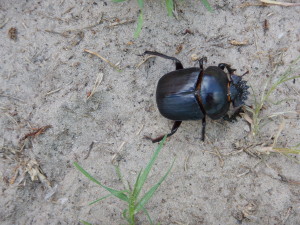At dusk, we saw a leopard! We paused our car to navigate a particularly deep ridge in the sand and she turned her head just when I looked up. If not for this trio of events, we would have driven right past, 20 feet from a leopard so camouflaged I can hardly find her in the photographs I took.
The leopard was likely snoozing on the tree island when we passed. Although the landscape is dry now, small hills that begin as termite mounds pepper the landscape and become islands when the flood comes. The sun was setting, washing red and orange across the horizon, silhouetting palm trees and acacias. As we watched, the leopard turned her head away and then back again – signaling a wary aloofness. I snapped photos in the fading light, not the best for my amateur photography skills. Then, amazingly, the leopard walked out of the shrubs across the anthill base and slumped down, apparently relaxing where she could get a better view of these interlopers in her domain. She was uncomfortably close. I hadn’t figured out how to close my window, which was especially inconvenient in that moment. But the leopard was just as cautious as I was. She was neither fierce nor afraid and watched the situation carefully for a change in dynamics – rather like me.
To see a wild leopard is an incredibly lucky thing. One of the people traveling with us has been a professional safari guide for 42 years! He’s seen leopards eight times in his life. The big cats are solitary, silent, and reclusive. They are mostly nocturnal, making them tough to find on safaris, which occur during daylight for some good reasons.
I searched on Google to find out how many leopards there are in southern Africa and couldn’t find a number. One website listed the number of leopards is “unknown”. The IUCN lists them as “near threatened”, with population numbers declining. The IUCN also reports that there are no reliable estimates of wild population size. If our guide has seen only 8 leopards in 42 years of safaris, their numbers are likely low, even if they are hard to spot (pun intended).
I learned a few interesting things from Google about leopards. They live in a huge variety of habitats – savannah, rainforests, mountains, swamps. They also eat all sorts of prey from dung beetles to antelope three times their size. Incidentally, if you think a dung beetle can’t make much of a meal, consider the size of Botswana dung beetles. They are slightly larger than my husband’s thumb and he’s a big guy!

All in all, it took over an hour for my heartbeat to calm down after seeing the leopard. This might also have been because, after leaving the leopard, the sun sank completely, leaving us to drive around the wild African bush in the dark – strongly advised against at all times.
Here’s why.
First, the landscape is studded with big holes – the kinds of holes that take even the best 4×4 out of commission. To make matters worse, these holes are only visible seconds before you drop your wheel into them, so you have to be both watchful and responsive to avoid the abyss. Watchfulness is somewhat derailed at night with our forward pointing headlights fading quickly in the absolute darkness of the bush. To partially overcome this, one of our party sat on the roof of the land cruiser, pulling hole-lookout duty. He did his job because we avoided the holes.
Second, there really are wild animals all over the place. We startled two giraffe and for a few seconds had the humorous view of their backsides running away from us in the focused light of our high beams. In addition to the leopard, there were also lions. We didn’t see them, but their guttural roars and sighs were audible from camp once we turned off the car engine.
There is nothing like lying in your tent in the African bush, moonlight streaming through the window, frogs and insects singing, and lions calling. “Lions do walk through camp at night. We know because we see tracks in the morning. So don’t leave your tent until the sun comes up.” That was the advice of one of the guys who lives for weeks at a time at ORI’s camp.
There was no chance I would leave my tent. Having evicted a spider that cast a disproportionately large shadow on the ceiling when I turned on my flashlight, I put my head down and was out like a light.
